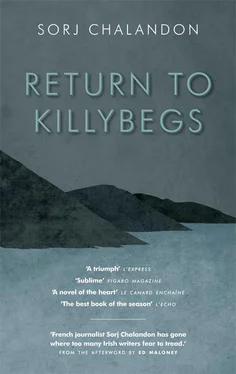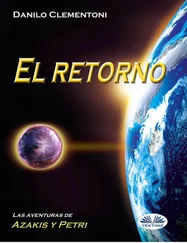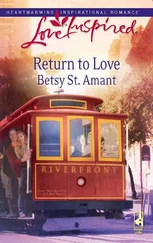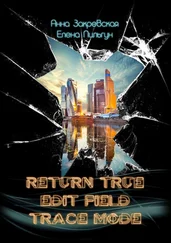Leaving Bobby Sands’s cell, the wee Frenchie had been deeply moved. I’d taken him by the shoulders and called him ‘son’. Thirty years earlier, I had christened him with that nickname. Blind drunk one day, he had told me that I was his Irish father. But this time the word had a different meaning.
— I love you, son, I told him in front of the prison door.
He looked at me. He wanted to answer, to whisper a word that would break the silence.
— I love you, I repeated.
Then he kept quiet.
My treason was drawing to an end. It was only a question of months, or weeks. After more than twenty years, I was no longer of any use to the enemy. It was going to let me go, to sell me. Antoine’s expression was one of the most beautiful ever directed at me, and also one of his last.
When the wee Frenchie used to look at me, I loved myself. I loved myself for what he believed about me, what he said about me, what he expected from me. I loved myself when he walked by my side like a general’s aide de camp. When he’d take care of me. As if his innocence could protect me. I loved myself through his devotion, the pride he had in me. I loved myself in that dignity he lent me, that courage, that honour. What I loved about him was all that his heart told me of myself. When Antoine looked at me, he saw the triumphant Fianna, Tom Williams’s companion, the Crumlin rebel, the unsubdued prisoner of Long Kesh. When he looked at me, Danny Finley was still alive.

But that day in Killybegs, that expression of Antoine’s had been extinguished. Him with his branches, me with my log. He was no longer seeing me. He was searching for the traitor. I smiled at him. I don’t know why. I built the fire. A white smoke was pushed back down the chimney by the wind.
— You can sit down, I said.
He took a seat at my father’s table, hands clasped between his thighs. I took off my wet cap and stuck it in my trouser pocket.
— If the Frenchman wants to come, he is welcome.
Father Byrne had passed the message on and here was Antoine, buried in silence.
— What do you want to know? I’m listening, son.
I turned my back, leaning over the bad wood.
— Nothing.
A tremor of a voice.
I served him his tea. He was looking at the wall, I was looking at the floor. Our eyes were no longer made for looking at each other.
— Do you want to know if Republicans died because of me?
— No!
He shouted, his arm flying up. He knocked his cup over, the tea burning his thighs. Not a cry, nothing. He moved his chair back.
— Do you not want to know?
He was watching the liquid dripping on the bare floor.
— You don’t want to know?
— I don’t know.
He didn’t know. He wasn’t angry, or sad. He was lost. A child deep in my wood. The IRA had warned him in Belfast. If he tried to meet me, he would be exiled. You turn your back on traitors, you don’t speak to them. You don’t cross the country to examine their faces. You don’t ask them anything. The traitor is ill. Those who have contact with him are infected. To see him is to understand him. To listen to him is to betray in turn.
— You know you can never come back to Ireland?
I was standing, back to the wall. He nodded. Yes, of course, he knew.
Since I’d bought him a cap the same as mine twenty years earlier, I’d never seen him without it. It was his Irish disguise. In Belfast, he thought it made him one of our own. In Paris, he used it to believe himself exiled. A farmer’s cap, the kind nobody wore any more, apart from old Tyrone Meehan and a few old men from postcards. With my cap, Antoine had become Tony. But this time it was a bare-headed Antoine who had come to see me. No longer wearing anything that tied us together.
The fire wasn’t taking. The smoke was clouding our expressions.
— And what about our friendship? asked the Frenchman.
Antoine stared at me at last.
— What about our friendship?
He lowered his head and I felt bad for having asked that. Answering a question with a question, the tactic of men without an answer.
He looked up at me again.
— Was it real, our friendship?
So that was it.
For a moment, I thought that the wee Frenchman had come here for me. To insult me or pity me. To tell me all the wrong I had done. To howl in disillusionment, anger, shame. But he had come for himself.
— I don’t understand your question, Antoine.
I turned back to the fireplace.
— Are you asking if I am your friend?
He nodded.
— That’s why you came this whole way, wee Frenchie?
Same timid movement.
I put my cap back on. His image of an Irishman.
— Look at me, and tell me what you think.
He shook his head.
— I don’t know any more.
— You don’t know much, huh?
He was disappointed. I was hurting. I don’t know which of us was the more wounded.
I could have answered him.
Reminded him that one day, in Paris, he’d met me in the metro. It was rush hour, the carriage was full. I was going to meet Honoré the bureaucrat in a café at Saint-Michel. At the Opéra station, I saw the wee Frenchman get on. His cap, his IRA badge, his endearing charms. I was astounded. Paris, more than twelve million inhabitants and I had come across the only one I wasn’t supposed to meet. God, chance, my bad conscience or his naivety made us take not only the metro, but the same line, the same direction and the same carriage on that day and at that time. I was sitting in a square of four seats. He was standing, facing me, gripping the rail with a challenging expression. In Belfast, I would have called him over:
— Antoine? Are you on operation or what, lad? Look at yourself, wee Frenchie, anyone would think you were mounting an assault! Unclench your jaw! Take a deep breath!
I shrank down in the seat. A woman across from me, a newspaper reader, a mother with a child on her knees. I was against the glass. I looked outside, a never-ending tunnel. He was observing the people. Our eyes met in the reflection. His eyes opened wide, his mouth dropped. He stiffened. He was astounded. It was he who received me in Paris, always. He who put me up, fed me, helped me to not get lost. I was his Irish resistance. Through me, he was fighting. He had the cap, the badges, but also the thrill of the secrecy. He asked me once what I was coming to Paris to do. I smiled.
— Are you working for the Brits now or what?
He blushed. Apologized. Never again would he ask stupid questions. He would come to meet me at the airport and take me back again. He didn’t have a driving licence, I used to pay for the taxi.
— It’s on the IRA, I’d tell him.
I’d take the bill and he’d be dead proud.
That Wednesday, I had no reason to be there without him in the metro, with the little overnight bag he’d given me. He came towards me, politely nudging around people’s elbows. I turned towards him, gave him a brutal look, put my finger to my lips, those sudden gestures that demand silence. He froze in the middle of the carriage. I gave a hint of a smile, reassuring him. He relaxed. He moved his head slightly, a silent acceptance.
— Understood, Tyrone!
I was in the middle of an operation, on a dangerous mission. He wasn’t supposed to know about my presence there. The IRA was protecting him. And this time I’d spare him. He was wearing his wee smile. His son’s smile. The one that always made my heart clench. The smile of one who understands without a word, who accepts without question. My wee Frenchie, my companion in silence.
In the space of one station, he had taken up the pose again, cap down over his eyes. He was no longer fighting, he was on the lookout. He had gone from soldier to sentry. I got up. He threw a long look over the crowd. He felt as though he was from another world, another history, part of a secret. He was at war, they were at peace. And his OC was there, protected by their unconcern. What pride.
Читать дальше













